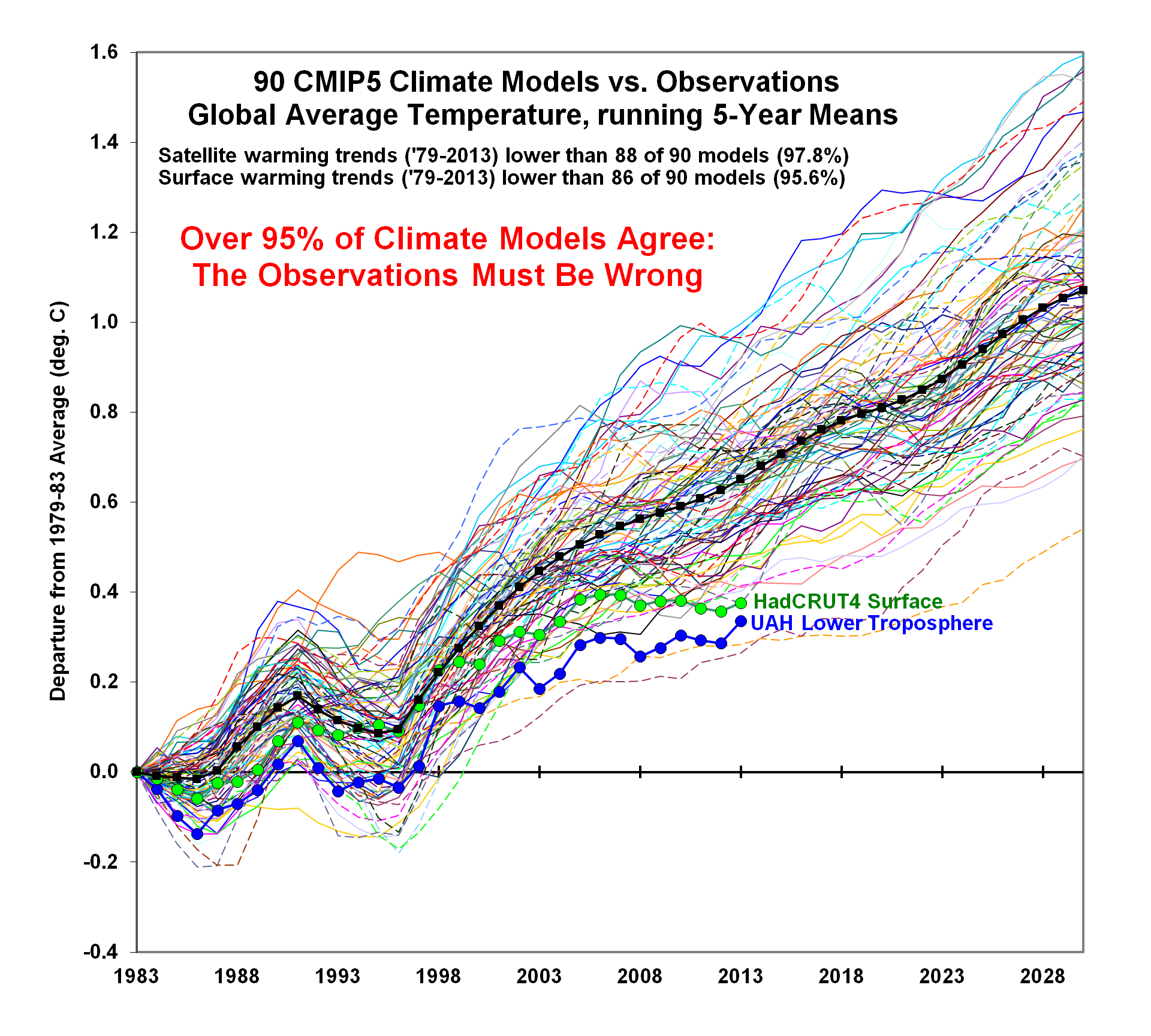
Thanks a bunch pj!
I'll take a look at it this evening and make some comments.
Jeff Masters was a classmate of mine at the University of Michigan. He believes strongly in dangerous global warming(global cooling actually seemed like the bigger threat when we started school there)
Hi again pj!
I was able to read the study and half a dozen things jumped out at me. I'll take a couple of pages to review with data/graphs to provide evidence.
1. Yes, global climate models predict an increase in hurricane intensities based on warmer ocean temperatures. They provide us with some impressive predictions in the next century. However, to date there has NOT been an increase in hurricanes or strength to go with the global warming so far. These models, also assume that temperatures will increase by a much greater amount than the actual warming so far. They are based on a speculative theory of greenhouse gas warming that is likely using equations that exaggerate the amplification from the increase in H2O, which triples the amount of warming from the increase in CO2.
2. All the global climate models to date have been too warm to much too warm. Since this warmth is the basis for the big increase in future hurricanes, then being too warm as they are, means that they are also over forecasting hurricanes/strength.....however, warmer oceans, should theoretically cause some stronger hurricanes.
3. Not to be overlooked however, is the fact that hurricanes help redistribute planetary heat, where the tropical latitudes have an excessive amount and higher latitudes less. Global warming warms the highest latitudes the most and reduces the meridional temp gradient and lessens the need to redistribute heat(this is one reason that we are having the least amount of violent tornadoes in recorded history-----zero of them last year). This may be one reason that slightly warmer oceans are NOT causing more and stronger hurricanes thus far.
https://www.marketforum.com/forum/reply_post/23977/
Global Hurricane Frequency – 1978 to Present
US Hurricanes 1851 – 2010

2018 will be the first year with no violent tornadoes in the United States
4. Rapid hurricane intensification in the past, before the age of satellites was not able to be as accurately measured as it has been since. Technology is capturing more and more of these rapidly intensifying hurricanes.
Just like the sudden bump up in weak tornadoes that occurred in the mid 1990's. It's claimed to be from climate change. Oh and BTW, the NWS installed 50 high powered NEXRAD doppler radars in the mid 90's that, for the first time, enabled radars to "see" the wind and detect and record many weaker tornadoes that were undetected before.
The violent tornadoes, which don't/didn't need sensitive radar systems to detect have gone way down.
5. They provide this stat:
Since 1950, here are the greatest 24-hour intensification rates prior to a U.S. landfall:
Humberto 2007 (65 mph increase, Cat 1 landfall)
King 1950 (60 mph increase, Cat 4 landfall)
Eloise 1975 (60 mph increase, Cat 3 landfall)
Danny 1997 (50 mph increase, Cat 1 landfall)
Michael 2018 (45 mph increase, Cat 4 landfall)
Harvey 2017 (40 mph increase, Cat 4 landfall)
Cindy 2005 (40 mph increase, Cat 1 landfall)
But miss many other ones(especially Wilma).........even those mentioned in this article:
."Maria intensified a remarkable 70 mph in 18 hours as it approached the Leeward islands, hitting Dominica as a Category 5 hurricane with 160 mph winds. Only Wilma (2005), Felix (2007) and Ike (2008) intensified more rapidly in 18 hours."
6. They state this: "For tropical cyclones across the entire globe, the two data sets disagreed. The “best track” data set showed a significant increase in 24-hour intensification rates, while the satellite-only data set did not. The authors theorized that the satellite-only data set was faulty, likely because of well-documented problems judging tropical cyclone intensities during formation of the eye. Due to this discrepancy in the two data sets, the authors were unable to make conclusions on how tropical cyclone intensification rates might be changing globally."
Yet somehow, they also can know this: "Thus, human-caused climate change must be responsible for a significant portion of the observed increase in Atlantic hurricane intensification rates."
7. The ending statement tells us where they are coming from: "It would be an excellent idea to aggressively pursue the goals of the Paris Agreement on climate change to help stave off a very dangerous potential increase in highly destructive hurricanes."
The Climate agreement will do ZERO to affect the climate and ZERO to affect hurricanes. It's just a transfer of wealth from the rich countries, which give their money to the poor countries.........including China and India which are allowed to continue to increase CO2 emissions more than the developed countries cut theirs.
Dr. Jeff Masters was a classmate and friend in the late 70's/early 80's. He was a much better student than me at The University of Michigan.......where we learned all about how to represent the physics of the atmosphere with mathematical equations.
A problem with this is that we have too many really smart climate scientists that use these equations to project/simulate the atmosphere for the next 100 years and think that they are so smart and right, that they won't objectively reconcile their theory with the observations/empirical data.
Meteorologists live in the real world where models are reconciled with the real weather every day...........and we bust weather forecasts all the time which helps us appreciated the limitations of computer model projections.
A climate scientist forecasting to the year 2100 will be long dead before then.
This is what I'm talking about below:
http://www.drroyspencer.com/2014/02/95-of-climate-models-agree-the-observations-must-be-wrong/
